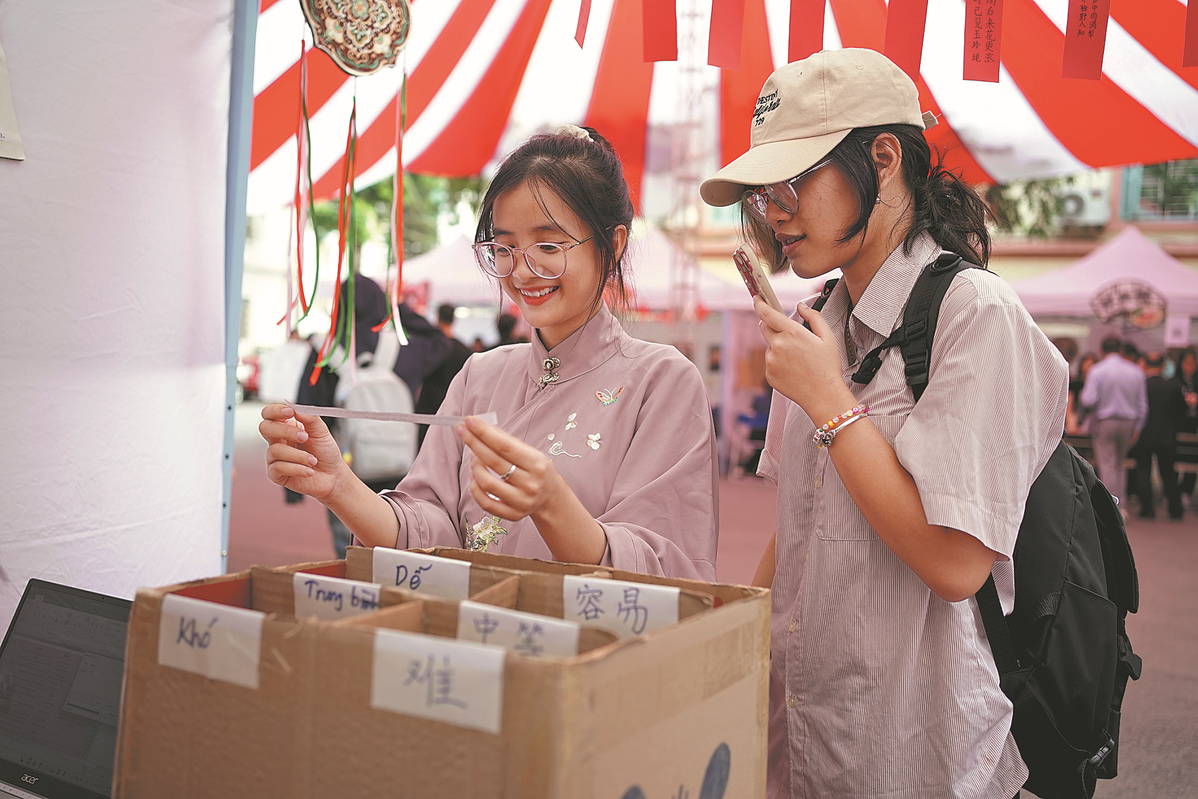Younger generation key to long-lasting relations


More efforts are needed to promote exchanges among the youth of China and Vietnam, as the younger generation is the future of the bilateral friendship, said Vietnamese experts and students.
"Vietnam and China should strive to nurture the friendship among its young people," Nguyen Vinh Quang, vice-president of the Vietnam-China Friendship Association, said.
As a leading China expert in Vietnam and one of the main translators of the Vietnamese version of Xi Jinping: The Governance of China, Quang participated in the Chinese leader's meeting with representatives of Chinese and Vietnamese youth and people who have contributed to the China-Vietnam friendship. The meeting took place on Wednesday, the last day of Xi's two-day state visit to the Southeast Asian country.
"I think Xi's remarks are very good when he said that the foundation of China-Vietnam friendship lies among their two peoples and the future of this friendship will be created by the young people," Quang said.
In 1999, the two neighbors set the guiding motto to promote bilateral ties as a neighborly friendship, comprehensive cooperation, long-term stability and future-oriented thinking. Quang said the future lies with the youth, and the younger generation of both countries should be friends.
Also at the meeting was Do Thanh Van, head of Vietnam's only Confucius Institute at Hanoi University.
Van said the meeting was very meaningful for promoting friendship between the two peoples, especially in deepening mutual understanding among young people.
She said Xi's message left a deep impression and gave her more confidence in promoting educational programs that combine Chinese learning and vocational training.
"The inheritance and promotion of the traditional friendship between Vietnam and China relies on the efforts of the youth," Van said.
Next year will mark the 10th anniversary of the establishment of the Confucius Institute in Hanoi, said Van, adding that it will continue to provide an exchange platform for young people from both countries to know more about each other, thus enabling them to become a strong force in enhancing the bilateral friendship.
On Wednesday, Xi's wife, Professor Peng Liyuan, visited the ULIS-Jonathan KS Choi Cultural Centre at Vietnam National University, Hanoi, or VNU.
Accompanied by Phan Thi Thanh Tam, wife of Vietnamese President Vo Van Thuong, Peng met some Vietnamese students learning Chinese.
Dong Xuan Duong, a senior student at VNU, said he was very honored and happy to participate in the exchange event between the university students and Peng.
"Madam Peng was very graceful, natural and friendly. She also understands the students' sharing and dreams well," Duong said. "I hope we will have the opportunity to welcome Madam Peng again and interact with her."
Duong said he hopes to study in China after graduation to gain a deeper understanding of the country and to contribute to future exchanges between the people of the two countries.
The ULIS-Jonathan KS Choi Cultural Centre was established in 2015 by the Sunwah Foundation of Sunwah Group, a Hong Kong-based conglomerate that has invested in Vietnam for over 50 years.
Minh Nguyet, a senior in Chinese studies at Hanoi University, said she expects to see closer cooperation between Vietnam and China after Xi's visit, as well as more job opportunities related to Chinese language.
"Studying Chinese offers great job prospects, even better than studying economics," Nguyet told China Daily.
Vietnamese students who study Chinese can work in various sectors, ranging from tourism to trade and logistics, as many companies carry out China-related business, she said.
This year marks the 15th anniversary of the Vietnam-China comprehensive strategic cooperative partnership.
Nguyen Truc Thuyen, head of the Chinese division at the University of Foreign Language Studies at the University of Da Nang, said she believes Xi's visit will further enhance bilateral cooperation and create practical benefits for people of both sides.
"I hope Xi's visit to Vietnam can serve as a catalyst for bilateral cooperation in culture, education, and other areas, injecting new impetus and providing more opportunities," Thuyen told China Daily.
































